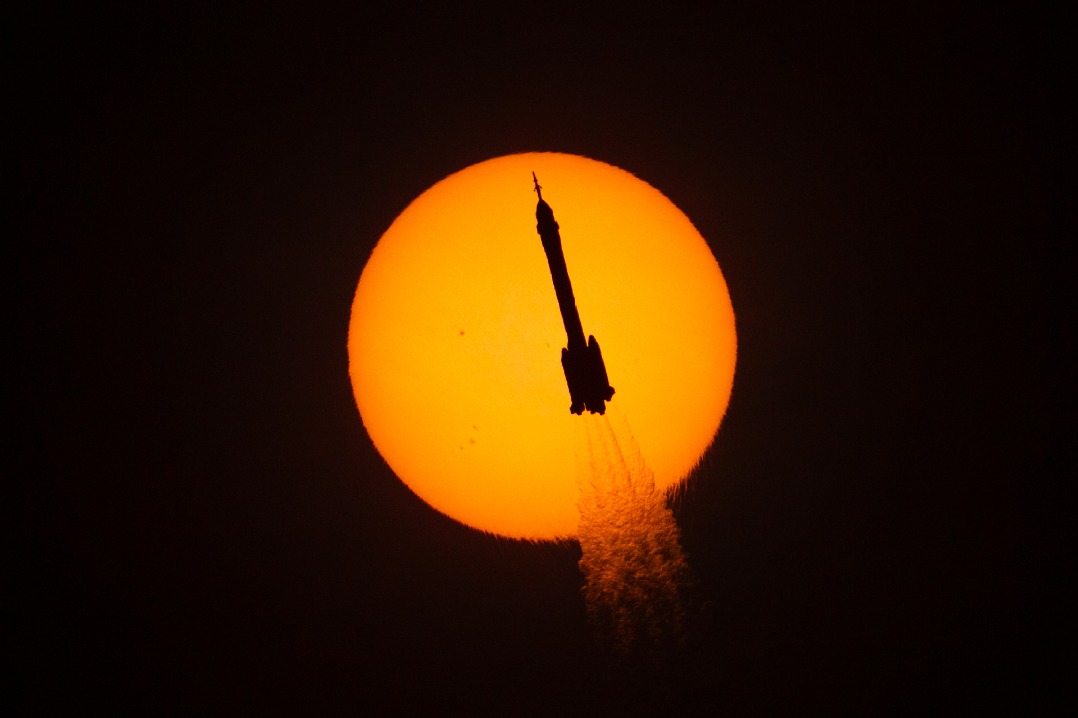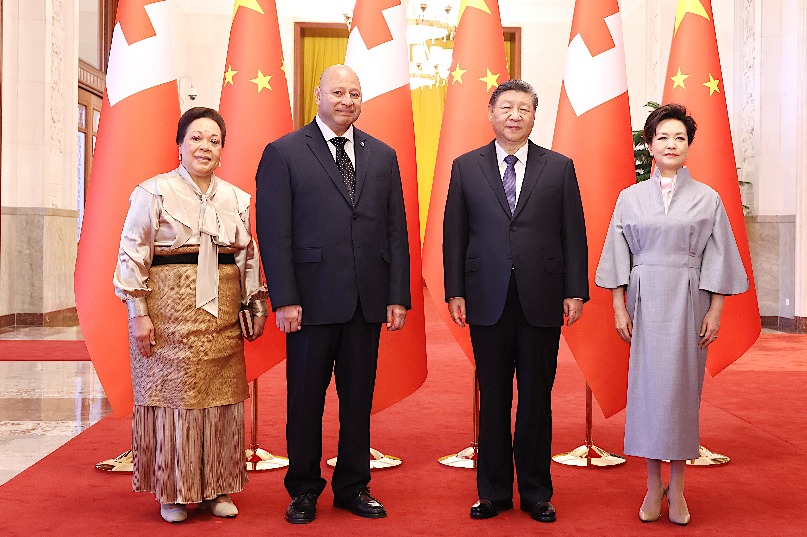Mueller: Trump didn't collude with Russia on 2016 election
By WILLIAM HENNELLY in New York | China Daily Global | Updated: 2019-03-25 23:07

Special Counsel Robert Mueller did not find any conspiracy between US President Donald Trump and Russia during the 2016 presidential election campaign, according to a summary of the report released by Attorney General William Barr on Sunday.
The special counsel, however, did not draw any conclusions on whether Trump obstructed justice.
For Trump and his supporters, it was an exhilarating sigh of relief at the end of a nearly two-year-long probe.
For his political opponents, there wasn't the "gotcha" some were looking for, but there were calls for further investigation.
"It's a shame that our country had to go through this ... hopefully someone is going to look at the other side," Trump said on Sunday while preparing to fly back from his Mar-a-Lago estate in Florida to the White House. "This was an illegal takedown that failed."
Earlier Sunday, Trump had tweeted: "No Collusion, No Obstruction, Complete and Total EXONERATION. KEEP AMERICA GREAT!"
Mueller was appointed on May 16, 2017, by Deputy Attorney General Rod Rosenstein, who made the appointment after then-Attorney General Jeff Sessions had recused himself from the investigation.
The probe produced 34 indictments, including Trump's former campaign chairman Paul Manafort, who was recently sentenced to seven-plus years in prison, and former national security adviser Michael Flynn, who has been cooperating with investigators.
The matter also generally divided Americans into two vociferous camps, with the side backing Trump seeing it as an attempt to nullify his election, while his opponents convinced themselves that the Russians affected the 2016 election results.
The special counsel's findings, which were delivered by Mueller on Friday, likely will have an effect not only on how Congress proceeds politically but also on the 2020 presidential campaign.
The Democrat-controlled House had shown some signs that it was leaning toward building an impeachment case against Trump, and a damning Mueller report probably would have added fuel to that effort.
But now Democrats in Congress and those seeking the White House may have to reconsider whether the specter of Russian interference still will have a place in their political toolboxes.
Most of the early reaction hewed to partisan lines.
"The fact that Special Counsel Mueller's report does not exonerate the president on a charge as serious as obstruction of justice demonstrates how urgent it is that the full report and underlying documentation be made public without any further delay. Given Mr. Barr's public record of bias against the Special Counsel's inquiry, he is not a neutral observer and is not in a position to make objective determinations about the report," House Speaker Nancy Pelosi, Democrat of California, and Senator Chuck Schumer, Democrat of New York, said in a joint statement.
"Good day for the rule of law," tweeted Republican Senator Lindsey Graham of South Carolina, chairman of the Senate Judiciary Committee and one of four members of Congress to whom Barr addressed his letter. "The cloud hanging over President Trump has been removed by this report. Bad day for those hoping the Mueller investigation would take President Trump down."
"The report makes it clear nothing existed except in the fevered imaginations of partisans in politics and the media. I hope the biased media learns their lesson, and Democrats are able to accept the undisputed facts and move on," Senator Rand Paul of Kentucky tweeted.
"In light of the very concerning discrepancies and final decision-making at the Justice Department following the Special Counsel report, where Mueller did not exonerate the President, we will be calling Attorney General Barr in to testify before @HouseJudiciary in the near future," tweeted House Judiciary Committee Chairman Jerrold Nadler, a New York Democrat, whom Barr's letter also addressed.
Democratic Senator Diane Feinstein of California and Republican Representative Doug Collins of Georgia were the other Congress members who received the letter.
Four Democratic senators running for president — Cory Booker of New Jersey, Elizabeth Warren of Massachusetts, Kamala Harris of California and Kirsten Gillibrand of New York — all called for the report's release to the public.
Barr's summary was a relatively terse 1,655 words, including the salutation and footnotes.
Barr wrote that "the report does not recommend any further indictments".
"The investigation did not establish that members of the Trump Campaign conspired or coordinated with the Russian government in its election interference activities," Barr wrote, quoting the report.
The investigation determined that there were two main Russian efforts to influence the 2016 election. One was attempts by a Russian organization, the Internet Research Agency, to conduct disinformation and social media operations in the US.
While the special counsel did not find that "any US person or Trump campaign official or associate conspired or knowingly coordinated with" the agency, the special counsel brought criminal charges against a number of Russian nationals and entities.
Mueller concluded that "Russian government actors successfully hacked into computers and obtained emails from persons affiliated with the Clinton campaign and Democratic Party organizations, and publicly disseminated those materials through various intermediaries, including WikiLeaks."
The special counsel brought criminal charges against a number of Russian military officers, alleging they conspired to hack into computers in the United States in a bid to influence the election.
But Mueller's team did not find that the Trump campaign worked with the Russian government in such efforts, "despite multiple offers from Russian-affiliated individuals to assist the Trump campaign".
The special counsel did not determine whether the examined conduct constituted obstruction. The report "leaves unresolved what the Special Counsel views as difficult issues of law and fact concerning whether the president's actions and intent could be viewed as obstruction".
Barr wrote that the special counsel stated that "while this report does not conclude that the president committed a crime, it also does not exonerate him".
But White House spokesman Hogan Gidley said: "Prosecutors don't exonerate, they prosecute. They don't prove a negative. That's just silly," according to politico.com.
The decision whether to pursue any charges of obstruction rested with Barr, who was confirmed as attorney general by the Senate in February. Barr also served in the same post under former president George H.W. Bush in the early 1990s.
"After reviewing the Special Counsel's final report on these issues; consulting with department officials, including the Office of Legal Counsel; and applying the principles of federal prosecution that guide our charging decisions, Deputy Attorney General Rod Rosenstein and I have concluded that the evidence developed during the Special Counsel's investigation is not sufficient to establish that the President committed an obstruction-of-justice offense. Our determination was made without regard to, and is not based on, the constitutional considerations that surround the indictment and criminal prosecution of a sitting president."
Barr's letter also said that Mueller's report is considered a "confidential report" to the attorney general, but said he is "mindful of the public interest in this matter. For that reason, my goal and intent is to release as much of the Special Counsel's report as I can consistent with applicable law, regulations, and Departmental policies."
The letter also detailed that Mueller employed 19 lawyers who were assisted by approximately 40 FBI agents, intelligence analysts, forensic accountants and other professional staff. The special counsel issued more than 2,800 subpoenas, executed nearly 500 search warrants, made 13 requests to foreign governments for evidence and interviewed approximately 500 witnesses.
























